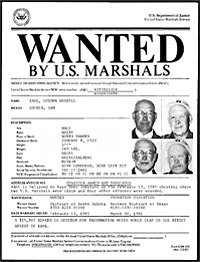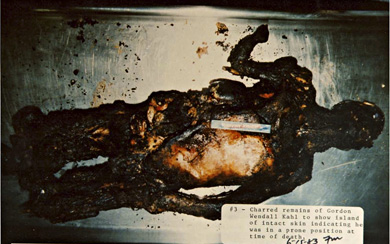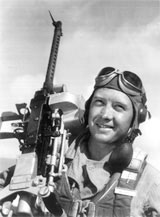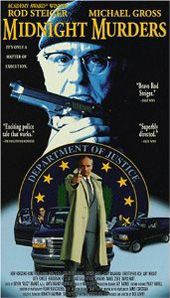Marlys Klimek
Marlys Klimek, was a juror in the ND trial of the Kahl family and friends.KLIMEK#2 00/30...And, when he came in to testify, his wife helped him in the court room. And, he told about getting the call to go out to Medina. And, when theygot out there, I'm sure you've heard this from others, when they were goingto originally going to set up this road block, or what ever they wantedto call it, they wanted to do it right in town. And, the city police justabsolutely said no...00/57... Some innocent people could get hurt, and so on and so forth. KLMK2But anyway, when they got out of the Ram Charger, he and Cheshire, hehad his badge on and Cheshire told him to take it off...1/10.... And, Nodland asked him "Why did you take your badge--why did hetell you to take your badge ouff? And, he said "I don't know." But, to my notion. That is not the way to arrent people take your badgesoff. ...1/26.... I mean they probably knew they were marshalls, I'm surethey did, but the way they made the confrontation out there in the....Insteadof saying that they were from the United States Marshall Service, and thatthey were under arrest,or anything like that, they got out of the vehicleand started calling them filthy names, and swearing at them, ...1/48...asDavid Brewer said in his testimony. He said "I thought they were abunch of hooligans." Well, you should have heard Dennis Fisher jumpall over him for daring to call marshalls hooligans....2/00... Well, that'swhat they appeared to him. And, I'm sure that's the way they sounded. But, all of that was covered in the instructions to the jury. I mean, theycan do that. They don't have to have a uniform on. They don't have to,you know.Everything is laid out. That's the way it impresed me. ...3/19...I agree with that, I really do. KLMK2I--another party in the case that I really felt sorry for Bud Warren.He was really put in a very dificult position during the trial. I don'tknow how many years he had been a marshall but he was handling the GordonKahl thing and at one point, and they brought this out, I have a hard timefiguring out why Muir had to go out there that particular day to try andpick him up....3/47... Not to expend any mor energy on that case, because it was a misdemeanor. And, of course Lynn Crooks tried to treat it with kid gloves too when Budwas on the stand. And, he of course, turned Muir down that afternoon. And, another thing to back track a little, when Muir took over as UnitedStates Marshall, he turned over all his files on Gordon Kahl and said thathe would work with him, you know, and this sort of thing....4/18... And,Muir didn't want any aprt of it. And, anyway, Lynn Crooks asked, he saidto him "But your way didn't work did it Bud?" ...4/28... "Well,no. But, I'm sure that they could have picked up Gordon Kahl peacefully,another time, another day."...4/38,,, Yes, it did. And, apparently he had meetings with him. They had tapesof meetings. ...4/56...And, I would think that when you get an order from your higherups that you are not supposed to spend any more time on it, that would beit. Not much no.KLMK2...5/24...Because, as August said, "That's the law." Somebodycomes to arrest you. You surrender. And, that's it. There's no in betweenthere, no. No extenuating circumstances." I don't know, I just feelthat it should never have happened...5/46...KLMK2...6/46...I just think, I really feel Muir wanted to show Bud Warren. I think there was something there--we don't know.KLMK2...7/06...I--apparently he was a gung-ho marshall. He was raring togo and get a tax protester. I was going to say collecter, get a tax protester,which is what I understood. Now, whether I got that from the trial, ornot I don't even know. Bob Muir said we're going to go out and get us atax protester today...7/27...KLMK2...7/39...Well, I definitely remember Sue Reardon. Isn't that her name,the one from Medina, she was a very angry witness, but a good witness. And, I don't believe she was totally telling the truth because I simplydon't think she saw everything she said she saw. ...7/59... For one thing,and this Lynn Crooks said himself...himself. They knew that Gordon Kahlis the one who walked over and shot Cheshire and the other one....8/11... And, yet she would not give in. She said she saw Scott Fall walk overand fire these two shots and they had no casings from his gun. And, Nodlandasked her again "In spite of all this do you still say you saw ScottFall walk over and...." She was a good witness, but she was an angryyoung woman...8/37... ...8/52...And, you know there were four of them in ;that kitchen watchingout a trailer house window, but yet they saw everything. The whole thingtook fifteen seconds, I guess, the shooting part of it, according to whatthe;y said ain court. And, the answer they gave that I thought was kindof funny, but Lynn Crooks asked them if they had discussed the case thatnight after everything was over and done with. "No. ...9/30... Theyhad just gone to bed. They hadn't talked about it." And, you takefour average people witnessing a masacre out there, and you don't discussit later. "Did you see this? "Did you see it?" and thatsort of thing. Oh....9/43... ...9/55...I tried to make a point when we were deliberating about remebering;about the witnesses said. I was kind of disapointed that we didn't geta transcript of the testimony which we couldn't see. You're supposed totrust your memory. And, so I had a chance to make a point when we werewondering who the alternates were going to be....10/14... I think someof us were secretely hoping that we were going to be dismissed after thetrial was over. You know there was only one who remembered how the alternateswere selected. ...10/25... I said okay, there's a good example. They arenow, or they said at the beginning of the trial, how the alternates wereselected and I said only one of us remembered. And, yet you think you rememberthis witnesses testimony. I think I remembered. It's impossible to havea perfect recall of all those days of testimony...10/44 ...10/55...Well, I remember Bud Warren. And, I remember Joan Kahl, ScottFall, David Brower...KLMK2...11/11...Well, Scott Fall I thought was a very intelligent young man. It made you feel sad that he got involved in a group like that and endedup in a situation. And, Yori of course had been brain-washed from the timehe was a young man...11/32... I don't think he ever--you had to feel sorryfor him a little bit. And, David Brower, he was not a violent person. He considered himself a peacemaker. ...11/45... And, this is anothe thingthat I wondered. I even mentioned that in the jury room. I hate to saythis but, I really feel that way, that some of the jurors disliked YoriKahl's attorney so bad and David Brewer's. ...12/08... In fact, I said acouple of times. Remember, the lawyer's aren't the ones on trial becausetheir attitude was really bad. And, when we were going over David Brower'scharges, Vinje, his attorney, made a big point when he was making his summationto the jury, about if there was anything at all that they could hold againstDavid Brewer was the fact that reached back and picked up a shell bag, andhanded it to Gordy Kahl. ...12/45... And, he made a big thing of this, otherwiseI don't think anybody would have even thought about it. Because, that wasthe big thing that came up in the jury room, because I know that Verna broughtthat up too. ...12/55... Whether he just did it automatically,or whetherhe did it intentially, or what, you know. And but, his attorney broughtit out...13/02... ...13/18...But, a big thing wasn't made out of it by anybody else buthis own attorney.KLMK2...13/46...Well, you know, the quickest way to sainthood is to die youngor die an untimely death. And, it just seemed like it was--you didn't darecriticize anything any of the marshalls had done. It just seemd like thedefense attorneys were walking on eggs all the time. ...14/05... And, thesame way with this Sue Reardon. If I were an attorney, which I'm not, ifI were Irv Nodland, I would have really come down on her...14/14... ...14/22...I don't think there's anything more dangerous than an eyewitness. They--they're dangerous. ...14/37...I mean, I can't believe that she just kept insisting thatshe saw Scott Fall do something that he didn't do and that the proscutionknew very well that he didn't do...14/47... ...14/56...Oh, I just feel that they must have been associated, you know,working in the same building there all those years. He certainly had tobe a friend of Bob Muir's, and Lynn Crooks, and the whole prosecution. ...15/25...Well, at the beginning when I was called and one of the ladiesat work said to me. "How can they get a fair trial in North Dakota?" And, I got very indignant. I said "Well anybody, you know, it's goingto be a fair trial because you are not going to pay any attenton to whatyou read in the newspapers and this and that." Well, I changed mymind a little bit. I think it should have been moved out of state. I'mnot saying the end result would probably not have been the same. I'm not,you know, judging what someone else would do, but....15/58... Well, you're talking about during the trial. ...16/Well, it got to the point where I dodn't even really believe halfof what I saw in the paper. You read contradicting stories, you might readsomething on page one that was one way and go back to page four or fiveand an entirely different color car, or what ever. And, he's right aboutthe newspapers. They cut out anything and everything. And, of course notelevision, radio or anything like that. Well, of course Scott Fall admitted shooting toward tht vehicle. Hedidn't know if he had shot anyone or not. And, they could not prove whodid. I just--I don't know, a conglomeration of things as I said there wasso much, with four defendants, and all these things coming at you. I'llgive you one example how they had this orchestrated. They had one pictureof this Ram Charger, the vehicle tht Cheshire was in, and with all bulletholes of course, and so they were going to show where the shots would havebeen coming from, so they stretched ribbon, of all things through theseholes. Well, anybody that knows anything about guns knows that ribbon canmean lots of different angles, you know. But, instead of showing this withmen standing at the other end of the ribbon, just in civilian clothes, thesefelows were dressed in camaflouge outfits, rifles, I mean looking like abunch of hoodlums, you know. And, I know that there was one remark Nodlandmade, he said to the witness who had this picture. "You took a littlepoetic license with that picture, I think, didn't you." But, I don'tthink everyone one the jury caught what Mr. Nodland meant. But, it dressedit up to look like a bunch of hoodlums behind these guns, you know, shootingat this Ram Charger. Oh, yes. I think that Bob Ramlo was in on that. But, I don't thinkthat it meant a hec of a lot, really, to anyone. I guess what he was tryingto show was that just the other possibility as it could have happened, youknow. He had quite a sense of humor, this Bob Ramlo. He was really interesting. He jsut seemed like he took everything with a grain of salt, but he wasa good attorney. And, I don't know if it was a decoy type of thing or what,but it didn't really amount ro a lot.KLMK2Well, this terrible feeling I had toward the end of the trial that everybodyhad their mind made up. I shouldn't say everybody. Verna didn't I'm sure. There was a Karen, and I know I guess there was another thing that disturbedme, when we had rached a verdict. Verna and I and Karen, well we shed afew tears, we felt pretty bad about having to. We had gone through it andwhat we had to do. Everybody else acted like they had won a contest orsomething. And, I thought "How could they be so happy and laughing,like they had won something, and it really hurt me. In fact, Verna, beforewe left the hotel, before we left for home, she brought me a--she wa a veryreligious lady. She read her bible every day, and all that sort of thing,brought me three verses she had written. She had taken the time to writeon a piece of paper. She thought it might make me feel better. But, Ijust--I felt terrible. She did too.Well, no on the first degree murder charge, I held off. I absolutelywould not go. Eventually, I think they would have all gone for guilty onthe first degree. I can remember--I thought it might have been nice ifone of us had been on a jury before and knew how to go about this becausewe were all--none of us really knew the proceedure. So, I gues the firstthing we did--well, we elected a foreman and he called for a vote. And,I know I voted not guilty on the first degree, but I can't remember if therewas anybody else, the first time around. And, then when we got to discussingit, I believe there were two or three that came along with me with the notguilty on the first degree. And,I just absolutely wouldn't give in. Anyway,they finally went on the the second degree and so on and so forth. And,I tried for a long time, KLMK2I wanted it to go to manslaughter. But, it didn't work. And, I keptgetting this from this one gal. Well, you're not supposed to let sympathyenter in. I said "Im not letting sympaty enter in." And, anotherthing she said "You have to use your common sense." I got a littlehuffy and I said "I've got as much common sense as anyone else inthis jury room." But, anyway I got even with her, when we got to JoanKahl, I knew everybody was going to vote not guilty, so I voted guilty. And, when they opened the votes and everybody looked at me and said "Wefelt sorry for her." I saiad "You're not supposed to let sympathyenter in. I made my point and that was enough." Well, that pretty much centered around that damn shell bag. And, I knowthat--Oh, I'll tell you another big mistake that I think the defense attorney'smade was to let that trial recess before the holiday weekend. They weregetting pretty anxious to get out of there. And, the jurors included. And, I think that was a big mistake. I'm sure they could have dragged itout another day or so. I felt bad about that. But, I think that in David Brewer's case it wasjust that darn shell bag, or whatever that held it up. Well, just this part where I said I felt that everybody ahd their mind'smade up before we even heard the defense witnesses. And, remarks that weremade. We're not supposed to discuss things like that. It really botheredme. You mean as for a sentence for him? Well, the charge was--I'd have to look at my instructions again.KLMK2Actually he did not carry a weapon. He could have gotten shot himselfin the cross fire. And, I think that when he gave him the shell bag hejust did it automatically. He wasn't thinking of helping him get away oranything like that. I don't know if what I would have given him a suspendedsentence. I don't know. As far as Joan Kahl, she was not a stupid woman. She sertainly knewwhat was gong on. So, if you want to say she was harboring or aiding andabetting, you know, she'd be just as guilty as Dave Brower, execpt for theshell bag, really. They did have some witnesses, and apparently everything was all right. In fact, I believe there was one farmer. It was a witness for--I don'tremember now. It must have been a witnes for the defense, I can't rememberfor sure. And, they just went to the meeting to see what they could dofor the depressed farmers, that sort of thing. And, he said that he didn'tfeel intimidated or anything. They weren't members of the Posse Committasor the tax protest group or anything. But, they just listened. At ksomepoint during the meeting, they got a phone call. I don't know if Dave Browergot the call, about the marshalls being around, whatever. And,then at sometime before there was an APB out. This is something that was never followedthrough either on Scott Falls station wagon. He supposedly was travelingfrom Texas to North Dakota with somebody by the name of Koba. Well, asit turned out, on the day in question, when theis APB came out. His wifehad the station wagon, if fact, in town doing the wash or something. And,I never could figure out that APB came from, where it came from or anything. So, they get a call--I think that was brough up in this call that camein that night that they were looking for Scott Fall and he didn't know why.I mean there was a lot of confusion, but appzarently they knew that themarshalls wee there, then made the switch of caps and jackets, and thatsort of thing.(END SIDE A #02 MARLYS KLIMEK)
KAPP#13(BEGIN SIDE A #04 MARLYS KLIMEK) Well, during the trial, one the marshalls mentioned another case theyhad been on where they babysat the jury for about thirty days. The juryhad decided to get together every year for an annual reunion. And, apparentlysomeone on our group decided that would be a good idea and I got a callKLMK4--I don't recall if it was about a year later, or what, that they weregoing to have a reunion at the Holiday Inn and wanted to know if I was coming. And, I said absolutely not. I wasn't interested. I guess I got a letterfirst and I got a phone call. And, so the jury foreman called me and wantedto know if I was coming, and I said no I wasn't interested in it. He wantedto know if I thought we had done the right thing, or how I felt about it. I said, "I wasn't sure. I don't know if we did the right thing. I'm not happy and I'm not coming." Well, I think the one ting that really bothers me--I think that hadthe lawyers questioned the jurors, I don't know how many of us would havebeen seated. Getting into how you feel about things--I just don't feelthat--like I said the pat questions that were asked by the judge aren'tenough to give you an idea what you think about, what your feelings are. I think that's a real bad deal. Did any of the other jurors that you talked to have any one from thePosse Committas contact them after the trial, at all? Well, it wasn't--it didn't last too long. She did a little tape andapparently she was--I' sure she was working for the group. Dennis happenedto be home--for one thing, she wanted my, to take my copy of the instructionsto the jury and photocopy it. And, then I changed my mind. And she said,well she got get it from the court house if she wanted to so she did. Sheleft her card and a couple of books. That was about all. No. Thats the only one, but I understand, I don't know if any of theothers even talked to her. Did you ever interview anyone--did you talk to Joan Kahl? Did she elaborate on the death of her daughter? Well, it was in the papers. But they didn't--it was not a real big thing. I felt bad when I read about it. I thought it was too bad that this thinghas to keep going on. But another thing--did she say anything about howthey damaged her home? The marshalls... No, just what we read in the papers. And, that sounded like that waskind of a farce too. I mean I--the one marshall was supposed to have gottenshot by his own companion, or whatever.KLMK4I don't know. It--you mean like wanting to set an example for the restof the tax protesters, that sort of thing? I don't know but there certainlywas some reason that Muir wanted to go out and get them. But, I thoughtthat was just because of something to do with Bud Warren, probably. Hewanted to show him up. He was going to bring him in.KLMK4At one point when we were deliberating on David Brower, now my understanding,I believe it's even in the instructions to the jury, that you're not supposedto make a determination on how long the sentences are going to be for thischarge or that charge. We were going through all this about the shellbag and all that, Verna and I and the rest of them, and at one point, thejury forman said "Well, I guess they decided to compromise becausethey all want to get out of there for the weekend." And, he said "Hecouldn't get to much for this. It's just a minor offense anyway, considerengthe time he's already served." And, then one of the other jurors,one of the other men said "We're not ging to let a..." how didhe put it now? I've even got it written down here in quotes. "We'renot going to let a minor thing like this screw up our weekend. This isa bunch of bullshit." So, then they decided to compromise. I meanthat's really how that verdict was decided, to be honest with you. Theywanted to get out of there, and that was the last one.KLMK4Oh, but one thing that I thought of a lot of times. I wonder how manytimes the marshalls, from the office in Fargo, didn't think "Why inthe hell did Muir go out and do this? In this mess we've got to find someculprits. We've got to get this case sewed up, one way or another, becausewe're going to send somebody to jail for this, or somebody to prison forthis." Oh, that lady that was here, she wrote that name down, that book. Ithink she was going to send to to me. She never did. She did give me two other small ones. It was quite an experience.KLMK4Oh, this is another thing--can you imagine if I have any other thoughts?I honestly believe, when that trial was over--I honestly believe that thatwould be appealed and it would be thrown out. They would get a new trialor whatever. I really believed that. Well, anybody that would, you know, having it in North Dakota; tryingall four defendants together; and they --the way it was set up--the shootoutthe wole bit out there at Medina; actions of the marshalls, you know. Ireally honestly did believe that it would be.... But, as I said, can you imagine trying to absorb that with one man standingup there reading it? Dennis was just teasing me today "You can't remember what happenedyesterday. How can you remember anything that happened seven years ago?"(END MARYLIS KLIMEK SIDE A #04- NOT END OF SIDE #04)
|
|
|
A timeline of the life of Gordon Kahl, from early childhood interests, to his marriage to Joan Kahl, his decorated military experience,
his outspoken tax protest, the Medina shootout, and his unusual death in Arkansas in 1983.
|
VARIETY / Indie documaker Jeffrey F. Jackson sticks it to the IRS and the Feds in "Death & Taxes," a hard-hitting reinvestigation of the 1983 Gordon Kahl case, about which questions still linger. Jackson's unfazed, investigative reporting-style approach and inventive handling of familiar material make this a controversial item for fests and progressive webs. Non-U.S. viewers will also get a charge out of its conspiracy theme. read more
CHRONICLES MAGAZINE / Gordon Kahl was a simple farmer who became famous for not filing income tax returns. Imprisoned and hounded by IRS agents who never did prove he owed any amount of money, Kahl and his son were involved in a shootout with police. The son is still serving a prison sentence, but the father was surrounded and shot in Arkansas by police officers who mutilated and burned his body. read more
GUNS & AMMO / A new video documentary, Death & Taxes, details a case of government murderously out of control that was briefly mentioned in the October 1994 Guns & Ammo article "The Ugly Truth About Gun Control." Death & Taxes is the story of Gordon Kahl, a North Dakota farmer and decorated World War II veteran, and his apparent death at the hands of federal agents. read more
|
|
Now Available!This set of 6 DVD's comprises over 13 hours of uncut footage, including a 2+ hour prison interview with Yorie Kahl, and candid interviews with wife Joan Kahl. In this rich stockpile of research, you'll find many more threads than could reasonably be pursued in the final feature.
The Death & Taxes Miniseries DVD Set Includes...
01: Gordon Kahl Meets With Head North Dakota U.S. Marshal Bud Warren (60 min)
02: The Beginning: Gordon Kahl's military experience and views on a variety of subjects (93 min)
03: Gordon's Texas Tax Trial (90 min)
04: Medina Shootout (60 min)
05: Gordon Kahl Was...: A montage of over 25 people describing who Gordon Kahl was in their eyes. (50 min)
06: Mysterious Death In Arkansas (90 min)
07: Media Circus: Chronological portrayal of Gordon Kahl in the media (70 min)
08: Yorie Kahl Prison Interview (150 min)
09: Joan Kahl Uncut Interviews (120 min)
A little-known fact regarding Death & Taxes is the surprising connection to Timothy McVeigh and the ATF / Oklahoma City Bombing. Here's a clip of Jackson sharing the story during a director's commentary on his film Postal Worker.
The story of Gordon Kahl so captured the attention of mainstream America that it was turned into a highly-rated made-for-television movie titled
In The Line of Duty - Manhunt In The Dakotas.
| DEATH & TAXES is the story of Gordon Kahl, a North Dakota farmer who became America's "most-wanted" fugitive. How had a WWII war hero become the target of one of the largest manhunts in FBI history?
|

|

The badly burned remains of Gordon Kahl, with an island of skin that shows he was in a prone position at the time of the fire.
Was Kahl a racist, gun-toting fanatic? Or a victim of an IRS policy of harassing vocal tax protestors into silence to keep the rest of us intimidated? Did Bill Clinton conspire to cover-up the torture and execution of Gordon Kahl in Arkansas? Did federal agents mutilate and burn the body to cover-up the murder of the wrong man?
DEATH & TAXES follows the trail of Gordon Kahl as his body is exhumed for a new autopsy. Building on newsreel clips covering two fiery shootouts and hundreds of interviews -- with IRS agents and federal prosecutors as well as Kahl's family and supporters -- D&T explores the myths and controversies surrounding a man who dared to challenge the federal income tax system. Some revile Kahl as a cop killer. Others revere him as an American patriot. Which was he?
|
|














